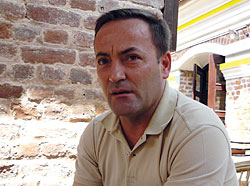Boris Cerina, ICRC Regional Weapon Contamination Adviser for Asia-Pacific, visited Nepal recently. Excerpts from an interview with Nepali Times:
 RABI THAPA |
Nepali Times: What brings you to Nepal?
Boris Cerina: I visit Nepal from my base in Bangkok every three to four months to exchange information on the situation in Nepal, as ICRC has no mine action delegation here.
I should also clarify what we do. Everyone, including the UN (which leads demining activities in Nepal), uses the terminology 'mine action' and 'mine awareness'. In reality we are all talking about the risks posed by different kinds of mines, unexploded ordnances, improvised explosive devices (IEDs) and small arms and ammunition � hence the term 'weapon contamination' that was introduced by ICRC last year.
So what work do you do on 'weapon decontamination' in Nepal?
We started a pilot project on mine risk education � again, including other weapon risks � in 2005, before the Comprehensive Peace Agreement (CPA) was signed. We were working in upto 46 districts in 2006-7, and are now back down to 10 districts.
We support two physical rehabilitation centres � the Green Pasture Hospital in Pokhara (since 2004) and the army rehabilitation centre in Kathmandu (since 2009). The centres treated a total of 1100 people in 2009, and distributed artificial limbs and crutches where needed, for free. ICRC also runs regular 'war surgery' courses, which are emergency and trauma courses for doctors.
ICRC programs such as Micro Economic Initiatives provide families, including victims of the conflict and landmines, with grants of Rs 10000 to get their lives back on track.
What is the situation with weapon contamination in Nepal?
The Joint Mine Action Working Group brings together diverse actors such as the Nepal Army, the UN Mine Action Team, INSEC and others (including ICRC/Nepal Red Cross Society).
There are no exact figures on how many mines there are, but there are 53 mine sites, mainly around army barracks. Twenty-four have been cleared, 20 more will be cleared this year, and the remaining nine should be cleared by the middle of 2011 by four demining teams. So we are doing pretty well on this count.
It's difficult to gauge the extent of IEDs that were used by the opposition, but these are what cause the most accidents, mostly involving children (60%). The total number of casualties since the CPA stands at 262.
Why hasn't Nepal joined the Ottawa Treaty on banning mines ?
155 countries have joined so far, but there are no reasons for Nepal not to join as it is already implementing parts of the treaty. There are other legally binding provisions such as destroying mine stockpiles and so on, but the reason seems to be a lack of awareness and prioritisation. This takes time, which is why events held during the UN's International Mine Action Day (April 4) are important. But progress is being made on the ground and the Ministry of Peace and Reconstruction is taking a proactive role; it is currently studying what joining Ottawa will require.
You've worked with ICRC close to two decades, starting in your native land, Croatia. How has this informed your approach, and what would you consider a success story?
You never get used to human suffering, you just become more professional, less emotional. And it is more difficult to be neutral in your own country. But our role is clear � it is to assist the victims of conflict, whichever side they are on.
All the places I have worked in are success stories in one way or the other. But compared to places like Cambodia, Afghanistan, Iraq and even the former Yugoslavia, the problem here was on a much smaller scale and was not complicated. In five years, we are already seeing the light at the end of the tunnel here. But we would like to see Nepal join the Ottawa Treaty.
READ ALSO:
Final betrayal - FROM ISSUE #496 (02 APRIL 2010 - 08 APRIL 2010)
Opiate of the masses - FROM ISSUE #496 (02 APRIL 2010 - 08 APRIL 2010)
Legacies of war - FROM ISSUE #496 (02 APRIL 2010 - 08 APRIL 2010)
'Anti-ordinance ordinance' - FROM ISSUE #484 (08 JAN 2010 - 14 JAN 2010)


